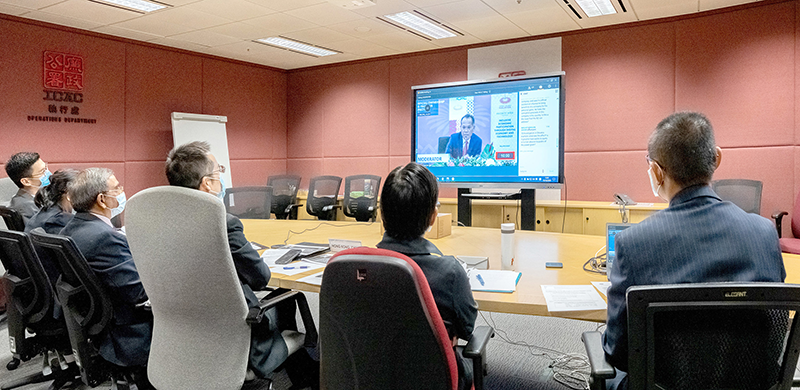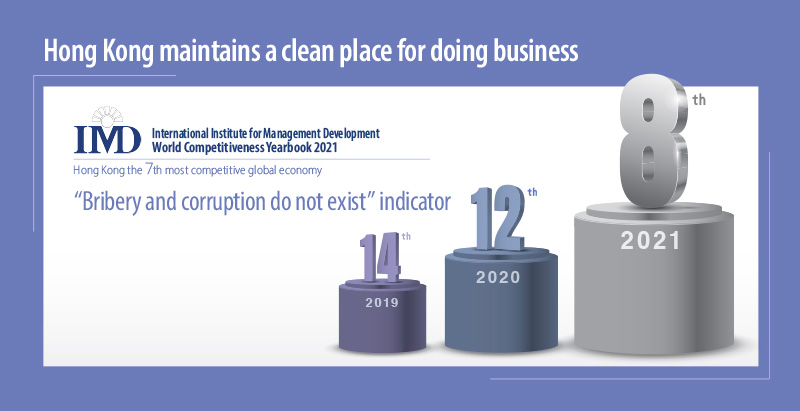專員隨筆
Commissioner Online
Inspirations from Global Collaboration against Corruption
Special Session of the Conference of UNCAC States Parties - Global Solidarity against Corruption
To mark the 76th anniversary of the United Nations in June 2021, a special session of the General Assembly was convened for the first time under the theme of challenges and measures to prevent and combat corruption and strengthen international cooperation. As a historical milestone in consolidating global efforts to combat corruption, the special session reaffirmed the joint commitment of the international community to fighting corruption. The General Assembly approved the adoption of a political declaration proposed by the States Parties to the United Nations Convention against Corruption (UNCAC), which highlighted that corruption was both a local and a transnational phenomenon affecting all societies and undermining economies. It was therefore essential to prevent and combat corruption through international cooperation.
Though rife with global geopolitical tensions, more than 190 countries across the globe had put their differences aside and forged a consensus on the political declaration at the special session of the General Assembly. Their joint commitment to preventing and combating corruption as well as strengthening international cooperation was commendable particularly amid the complex backdrop. The resolution of the General Assembly would hopefully start a new chapter in the global fight against corruption.

International obligation – Capacity building to break the vicious circle of corruption
The Hong Kong ICAC is under an international obligation to advocate global collaboration on the anti-corruption front. Such an obligation is stated in UNCAC, the most recognised anti-corruption treaty around the globe which sets out stipulations and systems against bribery within and among countries. The treaty also requires State Parties to assist strengthening each other's anti-corruption capability. Currently, 187 out of more than 200 countries in the world have become State Parties to the UNCAC. China, being a State Party since 2006, has designated the ICAC as the agency in Hong Kong to assist other countries and territories in preventing and combating corruption.
Over the years, the ICAC has organised various international anti-corruption conferences and training programmes on a regular basis, receiving more than 3,000 officials annually from anti-corruption agencies (ACAs) and international organisations from different jurisdictions to exchange anti-graft experiences. As the ICAC Commissioner, I serve as a member of the Executive Committee and the Convenor of the Training Committee under the international non-government organisation of the International Association of Anti-Corruption Authorities (IAACA). All-out efforts have been made to develop and coordinate international training programmes for IAACA, and to render assistance to its capacity enhancement work for ACAs. Following China's announcement of its "Belt and Road" (B&R) Initiative in 2017, closer collaboration has been made by the ICAC with the B&R countries, especially those having frequent economic activities with Hong Kong, to contribute to the development of a "Clean Silk Road" by providing capacity building training to their graft-fighters.

Since 2017, the ICAC has embarked on collaboration and exchange with around 60 B&R countries to enhance their anti-corruption capacity. A total of 29 training courses had been organised for some of these countries which were attended by about 1,000 anti-corruption officers. Training and consultation services tailored for these countries were provided, taking into consideration their cultural, political and legal differences. I noticed that while graft fighters from these places were full of passion and aspiration, they were often faced with a stalemate situation due to various constraints such as limited resources, political instability, lack of determination and courage from the government, inability for the ACAs to operate independently as well as deep-seated corruption in society. It is exactly this vicious circle of socio-economic setback and flagrant corruption that have left the people in these countries in an impasse. The predicament these people faced was indeed very distressing.

On the contrary, since the ICAC's inception in the 1970s, the corruption problem was successfully tackled, allowing the city to thrive socially and economically. At that time, the Hong Kong government had drawn reference from the successful experience of some foreign countries. Regrettably, those countries failed to sustain its anti-corruption efforts. As a result, the corruption situation, economy and people's livelihood gradually deteriorated over the decades. Some of these countries are now turning to the ICAC for assistance. While we are happy to share our experience, we also need to remind ourselves to stay vigilant at all times and not to take the good days for granted.
On that note, our country demonstrates a clear direction in anti-graft work: we must always be on the go and must not become complacent or lessen our efforts despite an interim success. We treasure the support of Hong Kong people and the determination of the SAR Government in the fight against corruption. Every one of us play a part in keeping the society clean and prosperous. And it is particularly important for the young generations to inherit our core values.
To explore how young people viewed corruption and law-abidingness, the ICAC recently conducted a series of focus groups participated by over 80 youngsters from different backgrounds. The majority of them supported a clean and probity culture and possessed basic knowledge of the anti-bribery law. However, when faced with the choice of whether or not to report corruption or situations involving personal interest, they considered their own interest their priority concern in the decision making process. We found this rather worrying. If all we care is our own interest, not giving any thoughts to public interest and civic responsibilities, Hong Kong's probity situation will gradually deteriorate. To address this concern, the ICAC will further strengthen its integrity education for young people. We will in particular, assist students develop an awareness of law-abidingness, as well as upholding fairness and justice in the society.

ICAC's anti-graft efforts earn global recognitions
Hong Kong has been recognised by the international community as a clean society. It is even hailed as the anti-corruption capital of the world. According to some academic researches, about 40 anti-corruption agencies around the world have modelled on the ICAC's structure and its three-pronged strategy. Over the years, many anti-corruption agencies and international organisations requested to partner with the Commission and invited us to provide anti-corruption training for their graft fighters. Apart from safeguarding the Hong Kong's probity, fairness and justice, the Commission has also made dedicated efforts to fulfil its international obligations to assist other countries and territories in enhancing their anti-corruption capacities, and promote Hong Kong's clean and level-playing field, as well as its sound rule of law.
ICAC's relentless anti-graft efforts continue to bear fruit and Hong Kong's integrity ranking has continued to rise in the reports of many well-known international ranking institutions. A recent example is the latest World Competitiveness Yearbook 2021 released by International Institute for Management and Development in June this year, in which Hong Kong's integrity situation was ranked 8th, rising from 12th in the previous year. Hong Kong was also ranked the 11th least corrupt place according to the Corruption Perceptions Index released by Transparency International earlier this year, five places up from last year. In addition, Hong Kong continued to be rated as the third cleanest place in Asia in the Perceptions of Corruption in Asia, an annual report published by the Political and Economic Risk Consultancy. "Its (ICAC's) own efforts continue to yield good results... perceptions in our latest survey of corruption show that people are still impressed with the way the government is fighting corruption," said the report. It is remarkable that the international community has continued to upgrade Hong Kong's ranking for its anti-corruption work, while the Western society has been seizing every opportunity to criticize the city's rule of law and other aspects.

Worldwide brand – enhancing capability as anti-graft front runner
Nevertheless, we must remain steadfast in our graft fight. Our city's rule of law, social and economic development hinge on a corruption-free society. International cooperation has also become a global trend in the fight against corruption. We must continue to join forces with our overseas counterparts. By doing so, we will continue to contribute to the international community, maintain Hong Kong's status as a front runner in the global fight against corruption and uphold the ICAC as a renowned worldwide brand. We will continue to further enhance the international community's confidence in Hong Kong as a level playing field for businesses, and cement Hong Kong's status as an international financial centre.

ICAC Commissioner
